
Recently on Cyclingnews.com |
The current time in Athens is 11:10 on November 16, 2025 - For current weather, click here
28th Olympic Games - JO
Athens, Greece, August 14-28, 2004
Athens promises unique festival of cycling
By John Stevenson & Cyclingnews staff
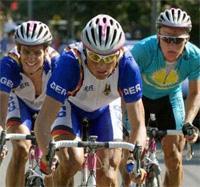 |
All three of cycling's major disciplines are represented at the Olympics, making the Games a unique event from a cycling point of view: the only time that elite-level competition brings together the very best road, track and mountain bike riders.
As always, cycling will be a big part of the Games - 480 of the event's 10,500 athletes are cyclists, comprising 212 road cyclists (145 men and 67 women); 188 track riders (153 men and 35 women) and 80 mountain bikers (50 men and 30 women). Cycling's history at the modern Olympics dates back to the very first Olympiad in Athens in 1896, which included an 87km road race - won by a Greek, Aristides Konstantinidis - and track races. There were no cycling events at the ancient Games, of course, because of the disappointing failure of the ancient Greeks to invent the bicycle.
The cycling program is spread through the 16 days of the Games, with the first event, the men's road race, on the opening day and the men's mountain bike race closing the cycling schedule on the second-last day of the Games.
Athens in August is expected to be hot and humid, which will no doubt affect all the cycling events. Warm-weather specialists will come to the fore in the road race, and the humidity will increase the chances of records being broken on the track.
Live coverage on CyclingnewsCyclingnews will be presenting live coverage of the men's and women's road races and time trials, plus up-to-the-minute results and reports from the track and mountain bike races. Full schedule coming soon. |
Road to gold
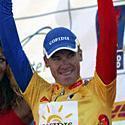
|
The individual road race at the Olympics is a slightly odd creature. With a maximum team size of just five riders in the men's race, and three in the women's, there's less scope for a powerful squad to dominate, although the strength of the talent being fielded by some nations - particularly Italy, Germany and Australia - is impressive. There's also the potential for national allegiances to be swamped by trade team loyalties - this is a professional sport after all.

|
The heat will certainly play a part, making favourites of riders such as Stuart O'Grady and reigning Olympic champion Jan Ullrich, while the powerful Italian squad headed by Paolo Bettini can never be discounted, provided team manager Franco Ballerini can crack the whip and get the Italians to work together.
Officially opened on August 11, the road race course is a 13.2km loop which the men will cover 17 times and the women 9, for total race distances of 224.4km and 118.8km respectively. Riders who have ridden it say it's hilly enough that the finale is unlikely to be a bunch sprint - this will be a hard, selective race that favours tough all-rounders.
The 24km, out-and-back time trial course hugs the seafront at Varkiza Beach, but the riders will be rather too busy to build sandcastles.
The individual road race was part of the first modern Games, and has been continuously included since 1912 but there has been some variation along with way. From 1912 to 1956 a team event was included, with team positions determined by simply adding up the placings or times of the riders in the individual road race. In 1960 the team road race was replaced with a 100km team time trial, and this in turn was replaced with the individual time trial in 1992.
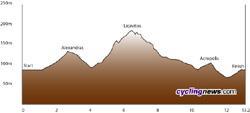
|
The women's road race dates back to just 1984, and the time trial to 1996.
In 2000 Leontien Zijlaard-van Moorsel executed a clean sweep of the women's events, landing gold in the road race and time trial, while the men's gold medals went to Jan Ullrich (road race) and Viatchislav Ekimov (time trial). Ullrich is back for 2004, but van Moosel is concentrating on the track this time; at 38 Ekimov seems unlikely to successfully defend his title leaving the time trial open to riders such as Ullrich.
Road race map & profile
Time trial map & profile
Turn left in Athens

|
While the Olympics is perhaps less important in the road cycling world than, say, the Tour de France, the track program at the Games is the blue riband of the discipline. Preparation has been extensive for the track events, with a new roof recently added to the Athens velodrome and test events run to iron out the inevitable teething troubles of what is effectively a new facility.
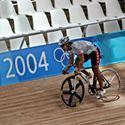
|
The track programme is expected to include some awesome showdowns as riders who have been working toward these games for the last four years finally get to face off. Will Australia's world record-holding team pursuit squad repeat its recent world championships successes or will defending champions Germany and upstart Britain cause an upset? Can Sarah Ulmer repeat her stunning world record ride in the 3000 pursuit at Melbourne, or will Leontien Van Moorsel defend her Olympic title? Is there a next generation of sprinters to take the podium top spot occupied by Marty Nothstein in 2000? Theo Bos of the Netherlands perhaps?
Track cycling's long Olympic history is littered with events we'd now consider, well quirky, to say the least. The 1896 Games included a 12-hour race, won by Austria's Adolf Schmal, and tandem races were part of the track program until 1972. The program continues to evolve, with the Madison making a thrilling debut in 2000.
Dirt number three
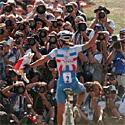 |
The baby of Olympic cycling events, cross-country mountain bike racing made its debut at Atlanta in 1996 and was an extremely popular event in Sydney in 2000. For 2004, the mountain bike race will be held at Parnitha, close to the Olympic Village and just a few kilometres north of central Athens, on a course that has room for some 14,500 spectators to cheer on the riders.
Given her stunning run of form this year, it's hard to imagine anyone but Gunn-Rita Dahle on the top step of the women's podium in Athens, but Italian Paola Pezzo has won both Olympic titles to date and is after a rare triple. In the men's race Filip Meirhaghe looked like a sure bet until his ignominious bust for EPO a few weeks ago, a development that looks likely to open the door for Switzerland's Christophe Sauser or Belgium's Roel Paulissen. Defending Olympic champion Miguel Martinez of France, having returned to racing exclusively on the dirt, remains a contender for this year's title.
